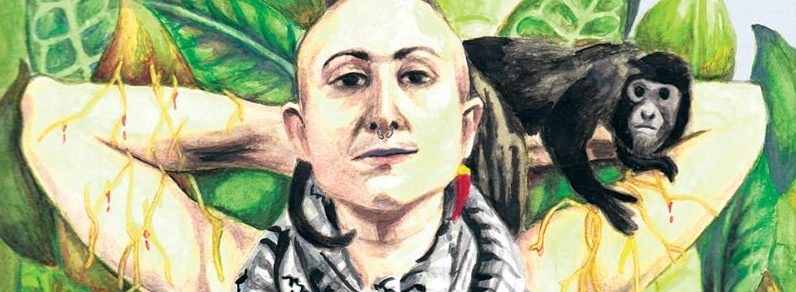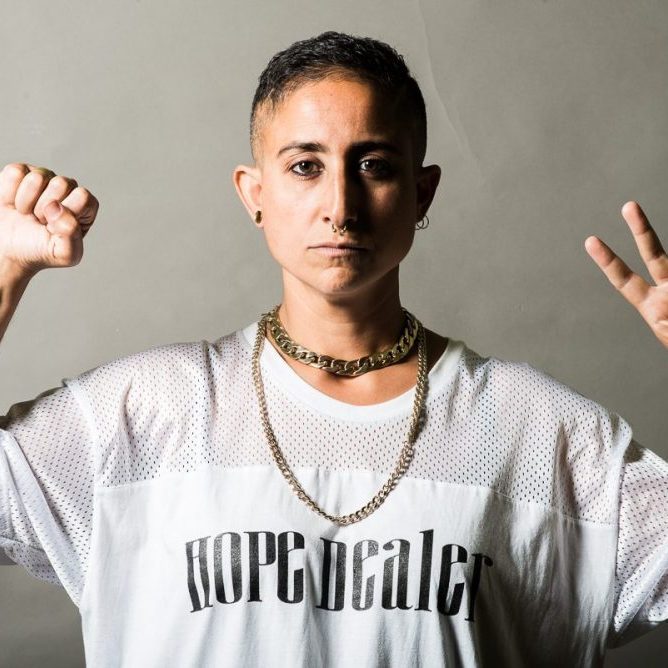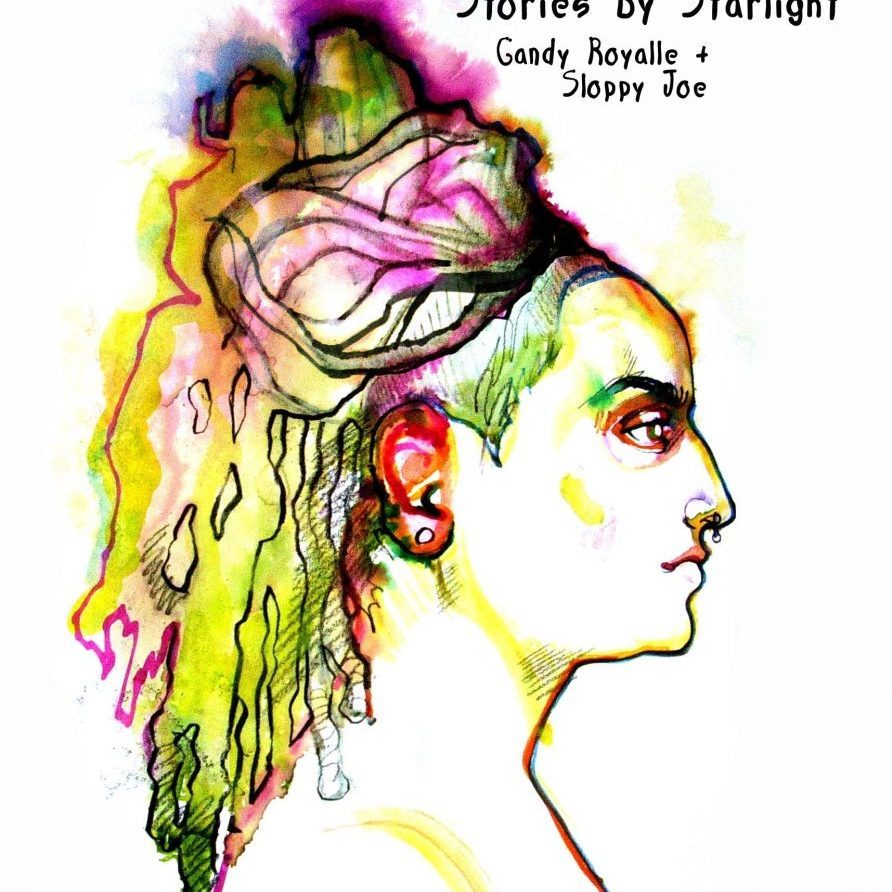 Recently in recovery after a courageous battle against ovarian cancer, Candy Royalle is back on stage with her explosive show FRIDA PEOPLE, along with collaborators Sloppy Joe and Betty Grumble.
Recently in recovery after a courageous battle against ovarian cancer, Candy Royalle is back on stage with her explosive show FRIDA PEOPLE, along with collaborators Sloppy Joe and Betty Grumble.
Royalle’s brand new show explores the human condition through performance, poetry, dance, grotesque burlesque and a musical soundscape spanning funk, soul and experimental chaos.
FRIDA PEOPLE also features musical trio, Sloppy Joe and self-proclaimed surreal showgirl, Betty Grumble. Betty Grumble is “Australia’s obscene beauty queen,” whose performances focus on the female body as a site for cathartic storytelling, metamorphosis and joy. Sloppy Joe has been playing together for 15 years and is predominantly an improvisational band, making every show that they play slightly different and always unpredictable.
Royalle recognises that poetry is generally considered to be quite serious. Her efforts to collaborate with Sloppy Joe with their funk and soul-inspired music, as well as Betty Grumble with her grotesque burlesque and dance-based performances, aims to make poetry more accessible. The show also aims to, in an entertaining way, stimulate dialogue and connection between individuals and others, as well as to themselves.
LOTL had the opportunity to ask Candy Royalle a few more questions about poetry and her brand new show.
How did you realise your love of poetry?
When I was really young, I felt really unheard – by my family, school, friends, the wider community etc and so I decided to put pen to paper and write about it. Writing poetry meant I could craft a response and express those feelings. When I discovered performance poetry I realised it was a way to finally be heard. This really started me on my journey of love for poetry. My love for reading and listening to poetry followed this and now I am immersed in it almost daily.
Who are some of your favourite poets? Do you have any artistic influences?
Artistically I would say I’m more influenced by powerful female artists such as Patti Smith, Lauryn Hill, Erykah Badu, Ani Difranco, Tori Amos and Bjork as well as the creations of Frida Kahlo.
My favourite poets who perform their work would have to be American Palestinian poet Suheir Hammad, African American poet Ursula Rucker, Queer poet Andrea Gibson, and rapper and poet Sage Francis. In Australia, I admire and adore the work of many of my contemporaries including Eleanor Jackson, Omar Musa, Scott Wings and the wonderful page poet Mark Tredinnick.
I saw you perform last year at the Bankstown Poetry Slam and I was blown away. Spoken word poetry is growing at an exponential rate in Western Sydney – why do you think this is?
Thank you! Historically, performance and slam poetry (of which there are major differences) are most popular amongst the disenfranchised and marginalised. There is a massive disconnect between what is happening in the suburbs of Western Sydney and the way it is viewed by those who don’t live there. There are stereotypes, assumptions and images perpetuated by mainstream media. Poetry gives voice to those who are voiceless it is a way of combating voice poverty. Poetry allows individuals the opportunity to challenge those misconceptions. It’s an opportunity for people to express themselves, to be heard and to debunk those perpetuated ideas of what their lives are like, in a supportive environment. I think all these reasons contribute to the success of poetry in the western suburbs of Sydney.
You bravely told fans that you had been diagnosed with ovarian cancer in your video “Love”. How did you react to the response from the community?
The reality is that after I released that video, I was inundated with support – fundraisers were launched, people sent me letters by snail mail, emails, messages on Facebook, people brought food to my house, others just came and spent time with me so I wasn’t alone. Multiple communities rallied together to look after me – my fans and supporters, the Queer community and the poetry community as well as my friends and family. The truth is, I wouldn’t have recovered so quickly or gone into remission as fast if I hadn’t been so loved and taken care of. I’m a supremely lucky individual to have been loved by so many – never felt alone or hopeless.
Do you have any advice for queer people in the arts sector?
I have never felt a sense of shame about my sexuality – which is not to say I didn’t have a hard time coming out, but I have never felt like my sexuality is a negative thing. That being said, for a long time I didn’t perform or write work that was gender-specific nor did I openly talk about my sexuality. Eventually, I took the plunge and decided I would just be true to who I was – that I would create and perform from a place of absolute vulnerability and truth which meant talking about my sexuality (occasionally – as it only makes up one part of me, not the whole of me). Once I started doing this, success soon followed. I realised people (i.e. audiences) can see through everything and really don’t care if you’re queer or straight or asexual or whatever – they just want a genuine performance. They seek truth – just as I do. Now, I am unapologetically me – politically, sexually, and emotionally – and I believe it is why I am so successful in what I do. I would encourage other queer performers, writers and musicians to be the same. I think my fear came from the idea I might alienate non-queer audience members but the reality is we all know what love feels like, whoever it is we’re loving. We all know what anger and happiness, shame and built, joy and pleasure feel like – who cares who you’re fucking? We’re all connected by far more than separates us.
Do you have any advice for queer people in general?
Don’t feel pressured by other people or their journeys. Always do what feels right for you – this is your experience, your life. Live it as you want to and always try to come from a place of respect and love.
How would you describe your upcoming show in three words?
I can do it in two: Intelligent entertainment.


